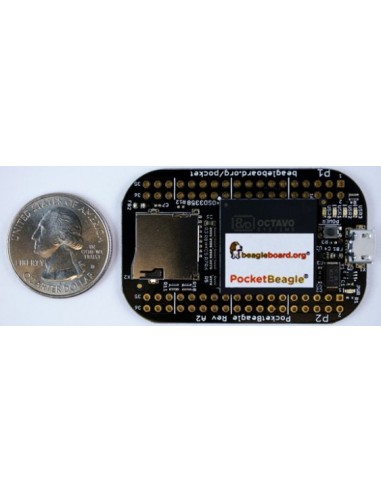- Out-of-Stock






Welcome to the PocketBeagle wiki!
Welcome to the PocketBeagle wiki!
https://beagleboard.org/pocket
PocketBeagle® is an ultra-tiny-yet-complete Linux-enabled, community-supported, open-source USB-key-fob computer. PocketBeagle features an incredible low cost, slick design and simple usage, making PocketBeagle® the ideal development board for beginners and professionals alike. You develop directly in a web browser and PocketBeagle® can easily be set back to factory conditions, leaving you free to experiment.
- 1GHz ARM® Cortex-A8 with NEON floating-point accelerator
- SGX530 graphics accelerator
- 2x programmable real-time unit (PRU) 32-bit 200MHz microcontrollers with single-cycle I/O latency
- ARM® Cortex-M3 for power and security management functions
- 512MB DDR3 800MHZ RAM (Integrated in the OSD3358-SM)
- 4kB I2C EEPROM (Integrated in the OSD3358-SM)
- SD/MMC Connector for microSD
- Debian GNU/Linux images customized for BeagleBone
- Cloud9 IDE on Node.js w/ BoneScript library
- Any BeagleBone Black software not needing access to unavailable expansion pins
- High speed USB 2.0 OTG (host/client) micro-B connector (USB0)
- Bootable microSD card slot (MMC0)
- TPS65217C PMIC is used along with a separate LDO to provide power to the system (Integrated in the OSD3358) with integrated 1-cell LiPo battery support
- JTAG test points
- gdb and other monitor-mode debug possible
- 55x35x5mm
- microUSB connector
- expansion header (3 options: battery, VIN or USB-VIN)
- High speed USB 2.0 OTG (host/client) control signals (USB1)
- 8 analog inputs with 6 at 1.8V and 2 at 3.3V along with 1.8V voltage references
- 44 digital GPIOs accessible with 18 enabled by default including 2 shared with the 3.3V analog input pins
- 3 UARTs accessible with 2 enabled by default (UART0, UART4)
- 2 I2C busses enabled by default (I2C1, I2C2)
- 2 SPI busses with single chip selects enabled by default (SPI0, SPI1)
- 4 PWM outputs accessible with 2 enabled by default (PWM0A, PWM1A)
- 2 quadrature encoder inputs accessible
- 2 CAN bus controllers accessible
- 23 programmable real-time unit (PRU) 32-bit microcontroller I/O pins including options for the PRU UART and eCAP accessible with 7 I/O pins enabled by default for PRU0 and 1 enabled by default for PRU1
- 3 voltage inputs with 1 for battery, 1 shared with the USB connector and 1 for power-line input and a battery temperature sense input
- 2 voltage outputs, 1 with a 3.3V LDO and 1 with switch from voltage input
- Power and reset button I/Os
You might also like